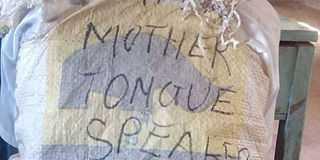Encourage use of mother tongue in schools

A pupil wears a sack as punishment for speaking in his mother tongue. To teach in “mother tongue” does not mean children will not acquire English. English will be taught as a subject from Grade One. PHOTO | COURTESY
What you need to know:
- Advocating English monolingualism will downgrade our 43 languages and obliterate essential elements of our diverse indigenous cultures.
- We must promote multilingualism by anchoring mother tongues in CBC and in that way bring up a generation of tolerant young people who will espouse unity.
As we embrace the Competency-Based Curriculum (CBC), it is crucial to examine the role of mother tongue in our education system.
The 1976 Gachathi Commission report provides that, for children in rural schools up to Grade Three, languages of the catchment should be used for their education, while Swahili be used for teaching in urban schools.
In education, a language can be used as a subject of instruction, a language of instruction, or both.
The first use means that it is taught as a subject just like Swahili or English. The second means that it is used to teach content subjects like mathematics. Here are some myths about the proposed usage of mother tongue in CBC …
One: Urban youth do not understand mother tongue: Mother tongue is the language that a person learns first from the mother/caregiver.
So, English is a mother tongue to some children just like Kiswahili, Marachi, and Sheng are to others.
MYTHS
The CBC provision is: use Dholuo, Swahili, Igikuria, French, Agikuyu, et cetera, as appropriate, to teach mathematics in lower primary before the children master the official language (English) from Grade Four. It will ensure that learning does not wait until the child masters English.
Two: Mother tongue breeds tribalism: Tribalism does not refer to the speaking of many languages. It is a situation in a multilingual community when those in power favour those who speak a language like theirs and exclude the rest.
Even if we adopt Swahili as the only language in our schools and offices, we will still experience inter-ethnic animosity as long as there will be a feeling-real or imagined-that ‘our’ community has been sidelined in promotions and public appointments.
Three: Knowledge of mother tongue prevents flawless speaking of English: To what extent a person speaks English with or without an accent is a function of aptitude, the English teacher/model, and access to other resources like TV, radio, and amount and frequency of input of English.
MONOLINGUALISM
Four: Mother tongue cannot be used in linguistically heterogeneous classrooms: In a Grade Two classroom in Kibra, Swahili will be the language of instruction.
But a creative teacher will ask his/her multilingual children to bring items in class and name them in their various languages before he/she moves to naming those items in the appropriate official language of teaching. Importance of this is beyond the scope of this article.
Five: It is easy to acquire English for every school going child, so English should be promoted from grade one: Research shows that many children from informal settlements and rural areas speak and learn English in classrooms only.
Much of this English is in code-switched form, in which teachers mix local languages and Swahili to explain concepts.
These conditions make acquisition of English difficult to acquire as compared to, for instance, Swahili or Tugen, which are generously heard at homes, playgrounds, and other social gatherings.
Advocating English monolingualism will downgrade our 43 languages and obliterate essential elements of our diverse indigenous cultures.
INTERACTION
But, multilingualism promotes a sense of community through common descent as a Kenyan people.
We must promote multilingualism by anchoring mother tongues in CBC and in that way bring up a generation of tolerant young people who will espouse unity and find pride in our multilingual and multicultural heritage.
Here is why the use of mother tongue should be unconditionally embraced in CBC.
A teacher speaking in English to a Grade One child from Geseneno village in Nyamira South Sub-County, for instance, is like someone speaking to you in Maori.
The essence of education is to build knowledge and both the teacher and the student must understand the medium of interaction.
That child from Geseneno comes with one important resource to negotiate knowledge with the teacher: That resource is Ekegusii, the mother tongue.
To teach in “mother tongue” does not mean children will not acquire English. English will be taught as a subject from Grade One.
BE EFFECTIVE
Second languages like English are best taught as subjects as opposed to using them to teach content subjects like mathematics.
In Germany, children are taught content subjects in German up to university, alongside the teaching of English as a second language. English is taught as a subject to enable their graduates communicate with foreigners.
In CBC, anything short of using languages learners understand to teach content subjects will be a retention of the status quo: rote learning, cramming for exams, teacher-centred classrooms, teaching for the test, and mass failure.
The best we can accord our children in primary schools is the freedom to negotiate ideas among themselves and with teachers through their mother tongues.
We also need to strengthen the teaching of English in preparation for transition at Grade Four.
Dr Mose, a lecturer and researcher, is a former postdoctoral fellow at Rhodes University, Grahamstown, South Africa.





